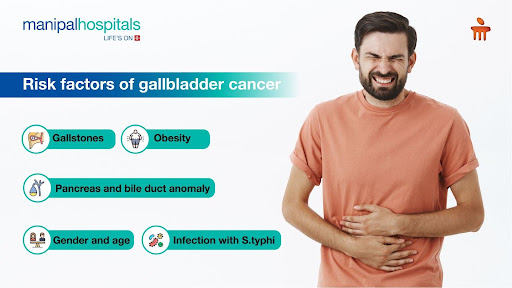Gallbladder cancer is an uncommon cancer, and the proportion of cancer deaths over incidence is higher. Gallbladder cancer mortality makes up 1.7% of all cancer deaths, while its incidence accounts for 1.2% of all cancer diagnoses1. Several risk factors contribute to the development of gallbladder cancer, which can be alleviated by taking proper precautionary measures. This blog post discusses common risk factors responsible for gallbladder cancer.
Synopsis
About Gallbladder Cancer
Gallbladder cancer is a rare but fatal illness. Because of the aggressive tumour biology, advanced stage upon diagnosis, complex anatomic position, and delayed presentation, gallbladder cancer has a dismal prognosis. Palliative Chemotherapy is used to treat diseases that are both locally advanced and metastatic. On the other hand, the early stage may be curable with Adjuvant Therapy (Chemotherapy or Radiotherapy) after Surgical Resection.
Symptoms of Gallbladder Cancer
Gall bladder cancer symptoms may not be apparent in the initial stages, however, you may develop a number of symptoms during the advanced stages of gallbladder cancer. Some of the symptoms you may experience are:
-
The yellowing of the skin or the eye's whites.
-
Itchiness on your skin
-
Darker urine and lighter stools than normal
-
Hunger or weight loss without attempting to gain weight
-
Fever
-
A mass in your stomach that feels hot
Consult our best Gastroenterologist in Mukundapur if these symptoms persist.
Risk factors for Gallbladder Cancer

1. Gallstones
Usually, gallstones and gallbladder inflammation, or cholecystitis, are the causes of gallbladder cancer. They are hard lumps that resemble little rocks and develop in the gallbladder. They are primarily cholesterol, along with other bile-derived chemicals.
2. Infection with S. typhi
Gallbladder cancer can be brought on by S. typhi. At chronic infection phases, S.typhi is known to be carcinogenic due to several mechanisms, including the release of toxin compounds, damage to host cell DNA, and the creation of a toxic environment.
3. Gender and age
As you age, your chance of developing gallbladder cancer rises. The majority of those who have it are between the ages of 85 and 89. As mentioned earlier, as this is an uncommon malignancy, the danger is still minimal. In women compared to men, gallbladder cancer is more prevalent. Women make up 71 out of 100 patients with gallbladder cancer (71%).
4. Obesity
Obesity, i.e., excess weight, raises the risk of gallbladder cancer, among other malignancies. Hormone changes are brought on by being overweight, especially in women. Additionally, being overweight or obese raises your risk of gallstones, which in turn raises your risk of gallbladder cancer.
5. Abnormality in the pancreas and bile duct
The pancreas is an additional organ that aids digestion by releasing fluids into the small intestine via a duct. Just as it enters the small intestine, this duct typically joins the common bile duct. Reflux, or the backflow of pancreatic juice into the bile ducts, is a condition in which there is a defect at the junction of these channels. Additionally, because of this backward movement, bile does not exit the bile ducts as rapidly as it ought to.
Diagnosis
The differential diagnostic tests that are performed to diagnose gallbladder cancer are:
-
Blood examinations: Your doctor may use blood tests to assess your liver function and identify the cause of your symptoms and signs.
-
Imaging tests: Magnetic resonance imaging (MRI), computed tomography (CT), and ultrasound are imaging modalities that can produce images of the gallbladder.
Treatment
Gallbladder tumor treatment options differ according to cancer's stage, general health, and personal preferences.
-
Surgery is the treatment of choice, and for this, a procedure called Radical Cholecystectomy is done in which the gallbladder and a small portion of the liver and lymph nodes are removed.
-
Chemotherapy or other therapies might be suggested if surgery is not an option. Chemotherapy can be given intravenously or as pills, and it uses medications to destroy rapidly proliferating cells, including cancer cells.
-
Targeted Medication Therapy may be an option for advanced gallbladder cancer patients, as it targets particular vulnerabilities in cancer cells.
To map out your ideal treatment plan, book an appointment with our Gastroenterology Hospital in Mukundapur.
Conclusion
Gallbladder cancer is an extremely dangerous and uncommon illness. If you suspect you may have gallbladder cancer, make sure you visit your doctor right away. Keep in mind that gallbladder cancer may not be evident until it is advanced, unlike other cancers that exhibit early symptoms. With years of promising results in treating cancer, Manipal Hospitals is always at your side for proper diagnosis and treatment. Check out our blog page for the latest updates in the medical world.
FAQ's
Successful treatment of gallbladder cancer depends on how early it is diagnosed. So early diagnosis plays a very important role in the treatment.
Based on the findings of physical examinations, imaging tests (X-rays, CT scans, etc.), endoscopic exams, and any biopsies performed prior to the initiation of therapy, help determine the cancer stage. Clinical staging for some malignancies also takes into account the findings of additional testing, like blood tests.
Some of the common signs of gallbladder cancer are:
-
Jaundice (yellowing of the skin, including the gums and inner lips, and yellowing of the whites of the eyes)
-
Abdominal pain and cramping
-
Nausea and vomiting
-
Bloating
-
A lump in the abdomen
-
Fever
-
Itchy skin
The primary course of treatment is Surgery, whenever possible. It's the most promising treatment option for cancer.
Kindly visit our website or contact the Oncology Department to schedule an appointment.



















 4 Min Read
4 Min Read














